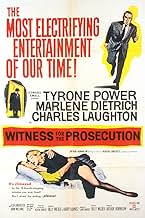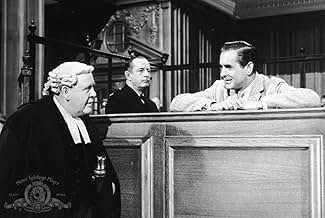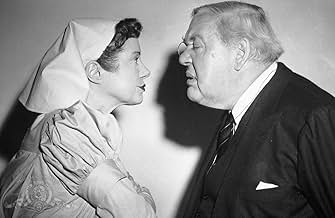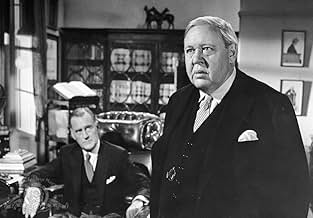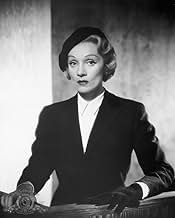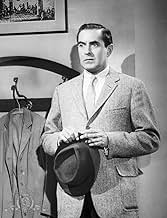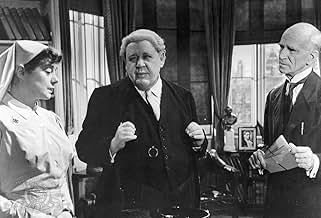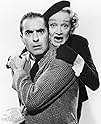एक अनुभवी ब्रिटिश बैरिस्टर को एक हत्या के मुकदमे में अपने मुवक्किल का बचाव करना होगा, जो आश्चर्यचकित कर देता है।एक अनुभवी ब्रिटिश बैरिस्टर को एक हत्या के मुकदमे में अपने मुवक्किल का बचाव करना होगा, जो आश्चर्यचकित कर देता है।एक अनुभवी ब्रिटिश बैरिस्टर को एक हत्या के मुकदमे में अपने मुवक्किल का बचाव करना होगा, जो आश्चर्यचकित कर देता है।
- 6 ऑस्कर के लिए नामांकित
- 3 जीत और कुल 15 नामांकन
Patrick Aherne
- Court Officer
- (बिना क्रेडिट के)
Don Ames
- Bar Patron
- (बिना क्रेडिट के)
Larry Arnold
- Courtroom Spectator
- (बिना क्रेडिट के)
Walter Bacon
- Bar Patron
- (बिना क्रेडिट के)
Eddie Baker
- Courtroom Spectator
- (बिना क्रेडिट के)
सारांश
Reviewers say 'Witness for the Prosecution' is celebrated for its intricate plot, masterful direction by Billy Wilder, and standout performances by Charles Laughton and Marlene Dietrich. The film delves into themes of justice, deception, and complex human relationships within a gripping courtroom drama. Its twisty narrative and surprising ending are often praised for enhancing suspense and entertainment. Despite minor critiques on pacing and some performances, the overall reception is highly positive, marking it as a genre classic.
फ़ीचर्ड समीक्षाएं
WARNING: SPOILERS AHEAD!
I'm not sure I have the ability to adequately praise this film. The original short story(rather unremarkable, actually)has been expanded into a magnificent example of Hollywood entertainment at its best. In addition to perhaps the finest line-up of character actors ever assembled(next to Cukor's David Copperfield, that is), we get Laughton and Dietrich at the top of their form. The person who criticised Lanchester's performance as "annoying" missed the point entirely. Miss Plimsoll is meant to be annoying! Also, what's with all the bad-mouthing of Tyrone Power? "Hammy"; "terrible"; "worst performance ever". These are the perceptive IMDb reviews? Only one of you got it right: it's hammy because Leonard Vole is the one acting, not Power! For 95% of the film, the character is dissembling, only showing his true colors at the end. Of course it looks hammy: Vole isn't a born actor like his wife. And to all those know-it-alls who called this film mediocre and predictable, I look forward to your upcoming film projects which I'm sure will be paragons of excellence and worthy to be set alongside classics of the golden age.
I'm not sure I have the ability to adequately praise this film. The original short story(rather unremarkable, actually)has been expanded into a magnificent example of Hollywood entertainment at its best. In addition to perhaps the finest line-up of character actors ever assembled(next to Cukor's David Copperfield, that is), we get Laughton and Dietrich at the top of their form. The person who criticised Lanchester's performance as "annoying" missed the point entirely. Miss Plimsoll is meant to be annoying! Also, what's with all the bad-mouthing of Tyrone Power? "Hammy"; "terrible"; "worst performance ever". These are the perceptive IMDb reviews? Only one of you got it right: it's hammy because Leonard Vole is the one acting, not Power! For 95% of the film, the character is dissembling, only showing his true colors at the end. Of course it looks hammy: Vole isn't a born actor like his wife. And to all those know-it-alls who called this film mediocre and predictable, I look forward to your upcoming film projects which I'm sure will be paragons of excellence and worthy to be set alongside classics of the golden age.
Yours truly has never been much of a reader, though with one notable exception: the work of Agatha Christie. I absolutely, positively worship this brilliant woman and try to read as many of her novels, short stories and stage play adaptations as possible. "Witness for the Prosecution" is a genuine classic, and although somewhat atypical for Christie, it is undeniably one of the greatest stories ever penned down. There's one major disadvantage about having read all of Christie's whodunits, of course, namely that you can't experience the same astounding twist-in-the-end twice! I would really have loved to be overwhelmed by the climax of this film- version, especially because Marlene Dietrich and Tyrone Power give away such fabulous performances. The story, with its fascinating characters and dazzling plot twists, does remain the movie's biggest strongpoint, but there are a number of more reasons why "Witness for the Prosecution" is righteously considered as one of the most massive milestones in cinematic history. Billy Wilder's surefooted direction, for one, and the stellar performances of the entire ensemble cast. I mentioned Dietrich and Power already, but there's also the downright phenomenal Charles Laughton (arguably the most shamefully neglected actor/director in history) and an appealing supportive role for Elsa Lancaster. But do I daresay that the ultimate success-factor of this stage play adaptation is the masterful re-creation of the court trial? The bombastic settings and decors, the echoing acoustics, the powerful monologues of confident (and arrogant) barristers and the intimidating gowns and wigs are largely what make "Witness for the Prosecution" not only the first but also the mother of all courtroom dramas. This may just be the opinion of an avid fan, but practically ALL great courtroom-dramas that were released from the sixties until present day ("To Kill a Mockingbird", "Philadelphia", "Devil's Advocate", "A Few Good Men"
) were clearly influenced by "Witness for the Prosecution". In fact, I only have one minor complaint: *** Spoiler **** the film version adds one more final twist that I didn't find 100% plausible.
To see "Witness for the Prosecution" for the first time in 2008 is a jolting surprise. Nobody could do it better than Billy Wilder did in 1957. A man accused of murder, Tyrone Power, the weakest link in this terrific chain. Sir Wilfred is called to defend him, he is played by the extraordinary Charles Laughton, but he's just out of hospital - he wasn't dismissed he was expelled - and due to doctor's orders he's not to take any criminal cases. He finds Power charming and personable enough but he's not going to risk his life to save his until Marlene Dietrich makes her entrance - and what an entrance! How marvelous that what amounts to a bit of Agatha Christie's usual fare becomes such an entertaining and at times right down riveting piece of film-making.
Another brilliant work in the legendary career of Billy Wilder. The director signs a cinematic adaptation of this Agatha Christie story: actually it is really as if the camera went on stage for filming the play. But the film is passionating and exciting, there's no time to get bored.
Another thing we shall not forget is that Billy Wilder is European. He manages to keep the spirit of the film very British, with lots of humour and sarcasm. Compared to films like this one, "legal" movies from John Grisham's novels are empty and meaningless, without soul.
Mr.Wilder is the director, we know; we have Charles Laughton, Tyrone Power and Marlene Dietrich: what a cast! Add a superb black and white cinematography... The result is amazing, with a film where dialogues are flawless and carry everything.
Times are different now, but the atmosphere and the taste of movies like this one are impossible to find in contemporary films.
Another thing we shall not forget is that Billy Wilder is European. He manages to keep the spirit of the film very British, with lots of humour and sarcasm. Compared to films like this one, "legal" movies from John Grisham's novels are empty and meaningless, without soul.
Mr.Wilder is the director, we know; we have Charles Laughton, Tyrone Power and Marlene Dietrich: what a cast! Add a superb black and white cinematography... The result is amazing, with a film where dialogues are flawless and carry everything.
Times are different now, but the atmosphere and the taste of movies like this one are impossible to find in contemporary films.
Witness for the Prosecution is one of the most entertaining courtroom stories of all time, written by the crime mistress herself, Agatha Christie. Charles Laughton completely owns the courtroom, starring as a famously brilliant barrister who's supposed to be taking a break for his health-but he gets drawn in by a truly compelling murder trial. Tyrone Power, in his last movie, has been accused of murdering a wealthy older woman. While all the evidence racks up against him, Charles doesn't give up hope and tries to win the case, all the while trying to crack the very hard nut Marlene Dietrich. Marlene is Tyrone's wife, and it's impossible to tell what she's really thinking or feeling.
I love this story, and I love both versions of the film, from 1957 and 1982. It's incredibly suspenseful and interesting-and also quite impossible to talk about without giving spoilers. If you've never seen Witness for the Prosecution, add this one to your list of classics to rent. The acting is fantastic, and the timing makes it a very entertaining old movie to watch. There are no boring bits in this drama; and I guarantee you'll still sit on the edge of your seat the second time you watch it.
I love this story, and I love both versions of the film, from 1957 and 1982. It's incredibly suspenseful and interesting-and also quite impossible to talk about without giving spoilers. If you've never seen Witness for the Prosecution, add this one to your list of classics to rent. The acting is fantastic, and the timing makes it a very entertaining old movie to watch. There are no boring bits in this drama; and I guarantee you'll still sit on the edge of your seat the second time you watch it.
क्या आपको पता है
- ट्रिवियाCharles Laughton, who could be moody and difficult, was apparently a dream to work with, throwing himself into the role with dedication and delight. Billy Wilder later recalled a day that was set aside just for shooting reaction shots of the jury and courtroom crowd (composed of extras hired only for the day). Normally, the assistant director would read the actors' lines, and the extras would react. However, Laughton, who was fascinated with the whole process of filmmaking, begged to help. So he came in on his day off and read all of the off-camera speeches to the jury members. He not only read his part but also the judge's, the prosecutor's, and even Marlene Dietrich's. According to biographer Maurice Zolotow in his book "Billy Wilder in Hollywood", "it was an exhibition of craftsmanship such as Wilder had never seen. He believes that Charles Laughton had the greatest technical range and power of any actor, man or woman, whom he has known."
- गूफ़(at around 9 mins) Inside his chamber, Sir Wilfrid lights his cigar, and Leonard Vole locks the door to make sure that Miss Plimsoll can't enter the room and catch him smoking. Later (at around 15 mins), Wilfrid leaves his chamber without first unlocking the door.
Actually, Vole does not lock the door, but puts the keyhole cover in place to stop Plimsoll spying through the keyhole.
- भाव
Sir Wilfrid: I am constantly surprised that women's hats do not provoke more murders.
- क्रेज़ी क्रेडिटAs the end credits appear on screen, an announcer's voice is heard: "The management of this theater suggests that for the greater entertainment of your friends who have not yet seen the picture you will not divulge to anyone the secret of the ending of Witness for the Prosecution."
- साउंडट्रैकI May Never Go Home Anymore
Music by Ralph Arthur Roberts
Lyrics by Jack Brooks
Sung by Marlene Dietrich (uncredited)
Reprised a cappella by Tyrone Power (uncredited)
टॉप पसंद
रेटिंग देने के लिए साइन-इन करें और वैयक्तिकृत सुझावों के लिए वॉचलिस्ट करें
विवरण
- रिलीज़ की तारीख़
- कंट्री ऑफ़ ओरिजिन
- भाषाएं
- इस रूप में भी जाना जाता है
- Testigo de cargo
- फ़िल्माने की जगहें
- उत्पादन कंपनी
- IMDbPro पर और कंपनी क्रेडिट देखें
बॉक्स ऑफ़िस
- बजट
- $30,00,000(अनुमानित)
- दुनिया भर में सकल
- $7,903
- चलने की अवधि
- 1 घं 56 मि(116 min)
- रंग
- पक्ष अनुपात
- 1.66 : 1
इस पेज में योगदान दें
किसी बदलाव का सुझाव दें या अनुपलब्ध कॉन्टेंट जोड़ें

![Trailer [OV] देखें](https://m.media-amazon.com/images/M/MV5BNTM2MjYzMjAtZjI5MC00YTI1LWI2MzAtMWFlNDc2OTU1MTRiXkEyXkFqcGdeQXRyYW5zY29kZS13b3JrZmxvdw@@._V1_QL75_UX500_CR0)
